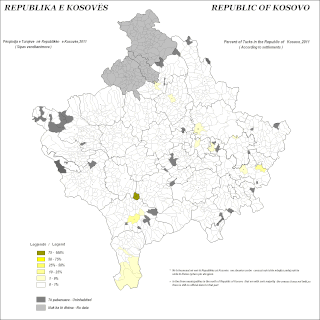Related Research Articles

Kosovo, officially the Republic of Kosovo, is a country in Southeast Europe with partial diplomatic recognition. It is bordered by Albania to the southwest, Montenegro to the west, Serbia to the north and east, and North Macedonia to the southeast. It covers an area of 10,887 km2 (4,203 sq mi) and has a population of approximately 1.6 million. Kosovo has a varied terrain, with high plains along with rolling hills and mountains, some of which have an altitude over 2,500 m (8,200 ft). Its climate is mainly continental with some Mediterranean and alpine influences. Kosovo's capital and most populous city is Pristina; other major cities and urban areas include Prizren, Ferizaj, Gjilan and Peja.

Prizren is the second most populous city and municipality of Kosovo and seat of the eponymous municipality and district. It is located on the banks of the Prizren River between the foothills of the Sharr Mountains in southern Kosovo. Prizren experiences a continental climate with some mediterranean influences.

The People's Movement of Kosovo was a political party in Kosovo active after the Kosovo War, having originally been founded as a political movement of Albanian nationalists in 1982. Despite participating in several elections in autonomous Kosovo, its pre-war existence was its most historically significant period. Historically, its support and membership came from Albanian diaspora, especially within Switzerland and Germany, originating mainly from former Yugoslav republics.

The Republic of Kosova, also known as the First Republic of Kosovo, was a self-declared proto-state in Southeast Europe established in 1991. During its peak, it tried to establish its own parallel political institutions in opposition to the institutions of the Autonomous Province of Kosovo and Metohija held by Yugoslavia's Republic of Serbia.

The Kosovo national football team represents Kosovo in men's international football. The team is controlled by the Football Federation of Kosovo, the governing body for football in Kosovo, and is under the jurisdiction of FIFA globally.

The flag of the Republic of Kosovo was adopted by the Assembly of the Republic of Kosovo immediately following the unilateral declaration of independence of Kosovo on 17 February 2008. The flag design emerged from an international competition, organized by an informal group from the Provisional Institutions of Self-Government known as the Kosovo Unity Team, which attracted almost one thousand entries. The winning design was proposed by Muhamer Ibrahimi. It shows six white stars in an arc above a golden map of Kosovo, all on a blue field. The stars symbolize Kosovo's six major ethnic groups: Albanians, Serbs, Bosniaks, Turks, Romani, and Gorani.

Turks in Kosovo, also known as Kosovo Turks or Kosovan Turks, are the ethnic Turks who constitute a minority group in Kosovo. Kosovo Turks make up the majority of inhabitans in Mamusha but also form considerable communities in Pristina and Prizren.
Foreign relations of Kosovo are accomplished by efforts of the Ministry of Foreign Affairs of Kosovo. Kosovo operates 33 embassies abroad and is host to 22 embassies in Pristina. Kosovo has membership in several international organisations.

International governments are divided on the issue of recognition of the independence of Kosovo from Serbia, which was declared in 2008. The Government of Serbia does not diplomatically recognise Kosovo as a sovereign state, although the two countries have enjoyed normalised economic relations since 2020 and have agreed not to try to interfere with the other's accession to the European Union.
Avni Spahiu is a Kosovar diplomat and former television director. During the period between 2008 and 2012 he served as ambassador to the United States. He was the Republic of Kosovo's ambassador to the Republic of Turkey from 2012 to 2019.
Sport in Kosovo is a tradition and plays a prominent role. Popular sports in Kosovo include football, basketball, volleyball, handball, and rugby, whereas major individual sports include wrestling, judo, swimming, boxing, karate and skiing.

Kosovo–Saudi Arabia relations are foreign relations between the Kosovo and Saudi Arabia. Like Saudi Arabia, Kosovo has a mainly Muslim population.

Egyptian–Kosovan relations are foreign relations between Egypt and Kosovo.
The Kosovo national under-21 football team is the national under-21 football team of Kosovo and is controlled by the Football Federation of Kosovo. The team is considered to be the feeder team for the Kosovo national team.

This is a list of Kosovo national football team results from 1993 to 2019.
Since Kosovo's declaration of independence from Serbia, international recognition of Kosovo has been mixed, and the international community continues to be divided on the issue. The Republic of Kosovo is member of some international intergovernmental and international non-governmental organisations.
East Timor–Kosovo relations refer to the bilateral relations between East Timor and Kosovo.
References
- 1 2 Geçmişten günümüze Kosova tarihi ve Türkiye-Kosova ilişkileri (in Turkish). T.C. Genelkurmay Başkanlığı. 2009. ISBN 978-975-409-515-9.
- ↑ Record of Proceedings. International Labour Office. 1999. p. 82.
- ↑ Efegil, Prof Dr Ertan (2016-08-29). Türkiye'nin çatışma bölgelerine yönelik dış politikasının analizi (in Turkish). gündoğan yayınları. p. 291. ISBN 978-975-520-331-7.
- ↑ Tabak, Husrev (2016-11-30). The Kosovar Turks and Post-Kemalist Turkey: Foreign Policy, Socialization and Resistance. Bloomsbury Publishing. ISBN 978-1-78672-055-9.
- ↑ Agency, Anadolu (2018-06-11). "Turkey's TIKA to restore 2 Ottoman mosques in Kosovo". Daily Sabah. Retrieved 2023-05-20.
- ↑ "Guvernatori Mehmeti takoi ambasadorin e Turqisë, Çagri Sakar | Banka Qendrore e Republikës së Kosovës". bqk-kos.org. Retrieved 2023-05-20.
- ↑ Alshiqi, Doruntina (2023-05-02). "The Ambassador of Turkey to Kosovo H.E Sabri Tunç Angili with a special lecture at AAB College". Kolegji AAB. Retrieved 2023-05-20.